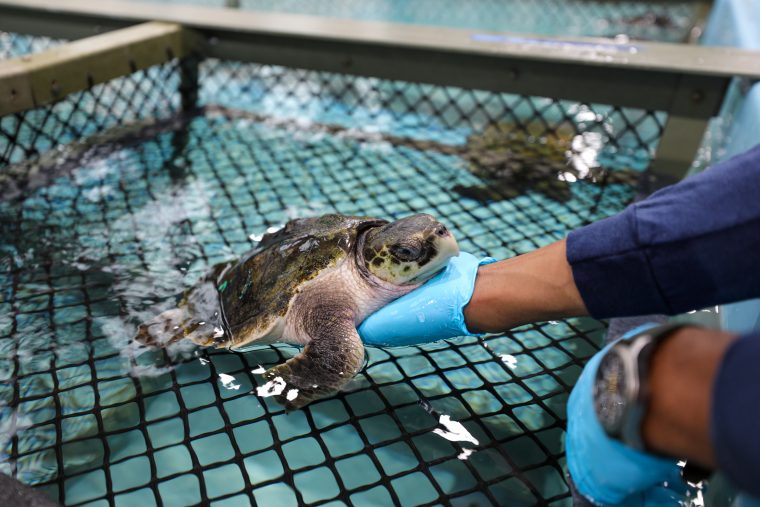Turtles receiving care for pneumonia and dehydration

BOSTON, MASS. (Nov. 28, 2022) – The New England Aquarium is treating a growing number of hypothermic sea turtles after warmer ocean temperatures delayed the start of the annual stranding season.
**PHOTOS AND VIDEO AVAILABLE HERE, WITH CREDIT TO NEW ENGLAND AQUARIUM**
The turtles began to strand on Cape Cod on Nov. 18. Staff and volunteers from Massachusetts Audubon Wellfleet Bay Wildlife Sanctuary have been walking the beaches in search of cold-stunned turtles and transporting the animals to the Aquarium’s Sea Turtle Hospital, where they are treated for life-threatening medical conditions resulting from hypothermia and the inability to feed. So far this season, Aquarium staffers have treated 153 sea turtles: 120 critically endangered Kemp’s ridley turtles and 33 green turtles.
“In years past, cold-stunned sea turtles would begin to wash ashore in late October. Milder weather means the waters of Cape Cod Bay are staying warmer for a prolonged period of time, which we believe could be a sign of climate change’s impact on the Gulf of Maine,” said Adam Kennedy, Director of Rescue and Rehabilitation.
Upon arrival at the Aquarium’s Sea Turtle Hospital, the animals are evaluated through a physical exam, bloodwork, X-rays, and measurement of heart rate and respiratory rate. Many of them suffer from dehydration and pneumonia.
“All of our sea turtle patients receive individualized care based on their condition. Depending on the severity, turtles may need weeks, months, and sometimes more than a year of treatment before they are at a point where we can clear them for release back into the ocean,” said Director of Animal Health Dr. Charles Innis.
The Aquarium works closely with the National Oceanic and Atmospheric Administration’s (NOAA) Fisheries Service, the non-profit organization Turtles Fly Too, and other partner organizations to help transport and rehabilitate the animals. To make room for new arrivals at the Sea Turtle Hospital, some stabilized turtles are transported to secondary rehabilitation facilities, where they continue care before being released into the ocean. Volunteer pilots with Turtles Fly Too began transport flights on Sunday, flying more than 40 turtles from the New England Aquarium and National Marine Life Center to the South Carolina Aquarium, Georgia Sea Turtle Center, and Atlantic Marine Conservation Society in New York. Another 12 turtles made their way to Mystic Aquarium by ground transport last week. Other more critical turtles remain at the New England Aquarium, where many will complete their full rehabilitation process before being released next summer.
The number of annual cold-stunned sea turtle strandings in Massachusetts varies from year to year but has steadily increased from around 50 in 2000 to more than 700 in 2021. Donations are crucial to continuing this conservation work. On Nov. 29, the Aquarium is launching a Giving Tuesday campaign to help support sea turtle rescue and rehabilitation, with donations matched dollar-for-dollar. Supporters can visit this website to contribute.
MEDIA CONTACT:
Pam Bechtold Snyder – psnyder@neaq.org, 617-686-5068
